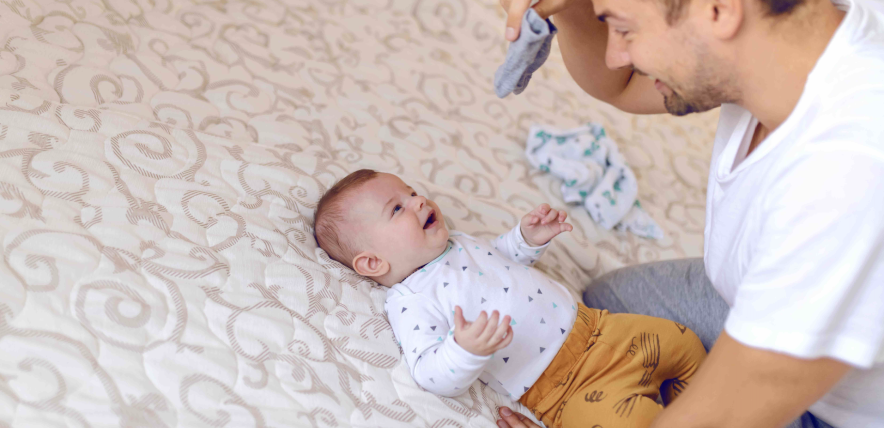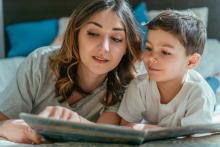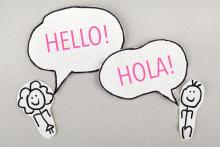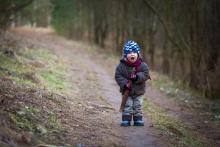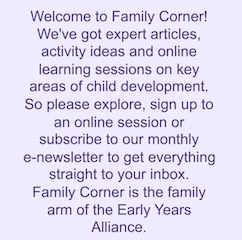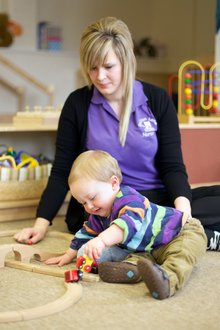It may be a surprise to read that babies start learning social skills as soon as they are born and demonstrate an instinct to interact straight away. At just a few days old, newborns appear to show a preference for human faces and will copy facial expressions of their main caregivers, such as sticking out their tongues when seeing a caregiver doing the same thing. Research suggests that this is the initial stage of children learning how to imitate those around them. Chemicals in babies' brains help them begin to form bonds and attachments with their main caregivers, and you can support this by responding in a sensitive way. For example, respond to babbles and coos with sounds and gestures - this process is called 'serve and return.'
Early communicators
As your baby grows, you will start to see more social interaction. Around six to eight weeks, your baby may smile at you for the first time; this is a great time to further practice the 'serve and return,' taking turns in this 'conversation' by cooing, smiling, and gurgling back to your baby. This will reinforce these positive interactions, releasing positive chemicals in your baby's brain. ‘Peek a boo’ games and tickling songs can be great alongside this. You might also start to notice your baby seems to have different cries for different things, for example a difference between a ‘hungry cry’ and a ‘tired cry,’ this is the beginning of babies expressing feelings and a first step towards communication. At around three to six months, babies will begin to recognise their name - singing songs using your baby’s name can support this stage of development.
Joint attention
One of the next stages of social development is being able to communicate to caregivers when they want something. Initially babies will use eye gaze, you can follow your child’s eye gaze and talk about what they see or bring something closer to them to look at (if it is safe of course). At around 6-12 months you may notice your baby beginning to point at things they are interested in and encourage caregivers to look at this with them, this is a social activity called ‘joint attention’ and will also form a building block of language and communication. Naming and showing an interest in what your child has pointed at will support this stage of development and embed the learning and help them to learn new words.
Between 6 and 12 months, babies are starting to form secure attachments that began at birth. It may take you by surprise when your sociable baby, who was always happy to go to other adults, suddenly only wants to be with you, but don't worry; this wariness is part of the attachment process.
Little explorers
By the time your baby is 12-18 months, they are using their developing social skills to learn and make sense of the world around them and will use joint attention to begin to understand main caregivers’ emotions. Your baby might also be becoming more mobile at this age, but you may still notice their continued need to be close to their main care givers. For example, your child may venture off to explore something new but stay in proximity, coming back to you regularly to ‘check in’.
Talk about feelings and emotions
At 18 to 24 months, you might notice your child enjoying playful teasing. For example, they may offer you an object and take it away again before you can get it while giggling. Your baby will begin to play side by side with other babies at this stage rather than interactively; children of this age will not yet understand the emotions of others, so as a trusted adult you can support them by labelling and talking about emotions. Your child may be showing more awareness of when another child is upset but is unsure how to respond. Research informs us that babies might start to recognise their own reflection in a mirror at this age too!
Remember, all children are different and will develop at their own pace, therefore the age ranges discussed are a guide only. However, if you are worried about your child contact your Health visitor, GP or speak to your child’s key person if they attend an early years setting for more support and advice.
Read more Family Corner blogs on children’s development here.
Written by Julie Pearson, Early Years Development Manager at the Early Years Alliance.

